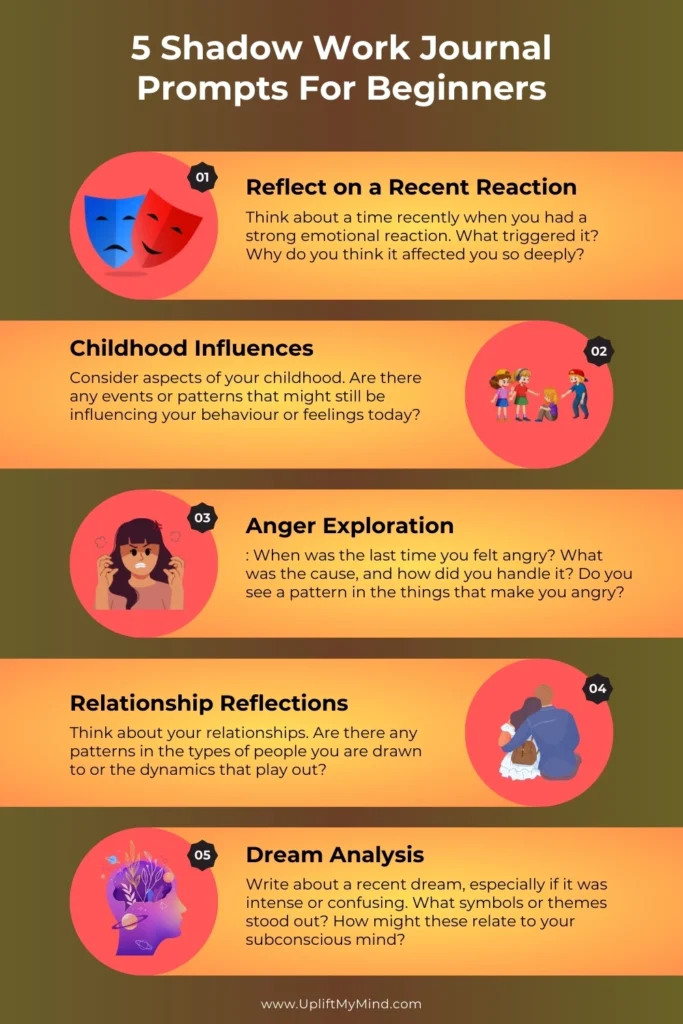Disclosure: Some of the links on this website may be affiliate links. As an Amazon Associate, we earn from qualifying purchases. The price you pay will be the same, but by using our affiliate links you are helping support our website. Learn more on our disclaimer page.
Introduction
Our shadow is something we all have, yet often remain unaware of. In fact, these shadow parts influence our behaviour and decisions even without us knowing.
“Until you make the unconscious conscious, it will direct your life and you will call it fate.”
Carl Jung
Carl Jung popularized the term “shadow work,” which involves bringing our unconscious aspects into the light. By uncovering the unconscious, we bring about self-awareness, peace, and healing. As we explore the unconscious, we notice patterns in our thoughts and behaviours. Accepting all parts of ourselves is essential in order to love and accept others.
Today, the concept of shadow work is widespread, yet it often causes confusion. Where does it come from? Why should you care? How can you start? What are the best practices?
Many people have spent years integrating their shadow parts and have valuable insights to share.
So, let’s get started, as we have a lot to talk about!
Getting to Know the Shadow Self

What is Shadow Work?
As we grow, we learn to hide parts of ourselves often, just to fit in. Our families and the society teach us what is acceptable and what is not.
As a result, we hide the parts that are “not approved“. This hiding creates a divide within us, which is what we call the conscious and subconscious mind. This self-preservation instinct of dividing ourselves into conscious and subconscious is our first act of self-rejection.
Shadow work involves bringing these hidden parts back into the light. These parts might include our fears, desires, and impulses that we consider unacceptable.
Bringing these hidden feelings to the fore helps us to recognize, acknowledge and accept ourselves. The process helps us become more comfortable in our own skin and understand ourselves more deeply.
Origin of Shadow Work
Shadow work has deep roots in psychology. Years ago, the revolutionary psychologist Carl Jung, who studied with Freud, observed that people had both conscious and subconscious aspects.
The conscious mind knows our visible traits, while the subconscious hides the traits we deny. Jung called these hidden parts the “shadow.”
The term “shadow” originates from the idea that these traits hide in darkness, unseen by our conscious mind. Of course, in order to notice something, you need to see it, just like how light reveals objects. So, when something is unconscious, we can’t see it, much like objects in a dark room.
Examples of Shadow Traits
Positive Traits: A confident girl might suppress her assertiveness if her family values quietness. As an adult, she might be sweet, quiet, and obedient, but deep inside, she feels the pain of exiling a part of herself. Discovering and re-owning her assertiveness can help her create a life that feels true to herself.
Negative Traits: A child punished for anger might hide this trait, leading to passive-aggressive behaviour as an adult. This person may not be aware of their anger, seeing themselves as easy-going. When confronted with their anger, they may not relate to it. Working to uncover and address this hidden anger can improve their relationships and self-awareness.
Benefits of Doing Shadow Work
As hard as we may try, denying, suppressing, or disowning parts of ourselves doesn’t make them disappear; it only fades them temporarily from our conscious awareness. This is why we often repeat patterns we don’t understand.
It helps us become aware of these hidden traits. This awareness can lead to personal growth and better relationships, and to break these patterns by bringing our hidden traits to light.
1. Boosted Self-Confidence
Shadow work involves understanding even those parts of yourself you don’t like much. Getting to know these parts can make you see how special and unique you really are, boosting your confidence big time.
2. Releasing Your Inner Artist
Did you know that your shadow self is hiding a creative genius inside you? That’s right, learning how to do shadow work can help you discover good ideas and viewpoints you never knew you had!
3. Better Friendships and Relationships
Learning what it means, helps you in understanding yourself so well that you can also understand others better. This makes your relationships stronger and more real, as you’ll find yourself getting less annoyed by the small stuff.
4. Living a True and Clear Life
Lastly, it brings clarity and honesty into your life. You’ll understand your true feelings and thoughts better, helping you make choices that are right for the real you.
How to do Shadow Work?

Let us look at some easy and practical steps:
I. Identify Triggers
Notice what makes you react strongly. These triggers can be clues to your hidden traits. For instance, getting angry on being criticized, might point to a hidden fear of “not being good enough“.
II. Reflect
Think about why these triggers affect you. What memories or beliefs are connected to these reactions? Reflect on past experiences that might have led to these feelings. This is a vital part of understanding what shadow work is.
III. Be Kind to Yourself
Indeed, going through shadow work can be tough at times, so it is very important for you to be as kind to yourself as you would to a close friend.
IV. Seek Help
Working with a coach or a therapist can provide the required guidance and support needed in your journey.
V. Bring Your Shadow into the Light
So, learn to accept and learn from the hidden parts of yourself. Doing this can make you feel more powerful and free.
VI. Be Kind to Others
As you learn more about yourself, try to be understanding and kind to others too. Everyone has their own struggles, and shadow work helps you empathize with them.
VII. Keep Growing
Indeed, understanding what shadow work is, is a never-ending journey is. Keep exploring yourself through activities like meditation and journaling.
VIII. Enjoy the Process
Lastly, be patient and acknowledge every little progress you make. Trust that learning how to do shadow work will lead you to a happier and more authentic life.
Effective Shadow Work Prompts: The Right Questions to Ask
The purpose of shadow work prompts is to help explore and understand your hidden emotions, thoughts, and behaviours.
They encourage self-reflection and help you discover hidden parts of yourself. For ease, we have categorized the shadow work prompts to help you focus on specific aspects of your inner world.
To get you started, here are top categories with effective shadow work prompts for each:
1. Emotions
- When was the last time I cried, and what was the underlying reason?
- What emotions do I tend to avoid, and why do I find them difficult to face?
- How do I express my anger, and what does this expression reveal about my inner world?
- When do I feel most vulnerable, and what situations trigger this vulnerability?
- What makes me feel deeply happy, and do I allow myself to fully experience this joy?
2. Fears
- What fear do I try to hide from others, and why am I ashamed of it?
- How do my fears limit my potential, and what steps can I take to overcome them?
- When do I feel most anxious, and what are the root causes of this anxiety?
- What fear am I most resistant to confronting, and how does it impact my life?
- How do my fears influence my relationships with others?
3. Relationships
- What patterns do I notice in my relationships, and what do they reveal about my inner dynamics?
- How do I react when someone sets boundaries with me, and what does this reaction reveal?
- What aspects of myself do I suppress in my relationships, and why?
- How do I handle rejection in relationships, and what past experiences influence this reaction?
- What role does trust play in my relationships, and how has it been shaped by past experiences?
4. Self-Perception
- What patterns do I notice in my relationships, and what do they reveal about my inner dynamics?
- How do I react when someone sets boundaries with me, and what does this reaction reveal?
- What aspects of myself do I suppress in my relationships, and why?
- How do I handle rejection in relationships, and what past experiences influence this reaction?
- What role does trust play in my relationships, and how has it been shaped by past experiences?
5. Past Experiences
- What significant events from my past still affect me today, and how can I heal from them?
- How did my childhood shape my current beliefs about myself, and are these beliefs still serving me?
- What past experiences have shaped my fears, and how can I address them?
- How have past relationships influenced my current behaviour and expectations?
- What lessons have I learned from my past mistakes, and how can I apply them now?
6. Behavioural Patterns
- What habits do I have that I consider self-destructive, and what fears or beliefs fuel them?
- How do I react under stress, and what patterns emerge in these situations?
- When do I procrastinate, and what underlying fears or beliefs contribute to this behaviour?
- How do I handle success, and what self-sabotaging behaviours might I engage in?
- What repetitive thoughts or behaviours do I notice in myself, and what do they signify?
7. Triggers
- What specific situations or people trigger strong emotional reactions in me, and why?
- How do I respond when I feel misunderstood, and what does this reaction reveal about my inner world?
- When do I feel most defensive, and what underlying fears or beliefs are triggered?
- What triggers feelings of guilt in me, and what past experiences contribute to this?
- How do I manage feelings of overwhelm, and what triggers these feelings?
8. Inner Desires
- What unfulfilled desires do I have, and what fears prevent me from pursuing them?
- How do I feel about my ambitions, and what beliefs influence these feelings?
- What secret dreams do I hold, and why have I not acted on them?
- How do I perceive my potential, and what hidden desires are tied to this perception?
- What do I truly want from life, and what steps can I take to align with these desires?
9. Values and Beliefs
- What core values do I hold, and how do they influence my daily actions?
- How do my beliefs about the world shape my interactions with others?
- What societal expectations do I feel pressured by, and how do they affect my self-view?
- When do my actions conflict with my values, and what does this reveal about my inner struggles?
- How have my values changed over time, and what experiences have influenced these changes?
Challenges and Misconceptions about Shadow Work

Shadow work can be painful because it brings up old rejections. To acknowledge something suppressed into your subconscious mind means facing the pain of having had to fracture yourself to be loved.
This process can trigger survival mechanisms, making it feel like you’re facing rejection again. This is why self-awareness isn’t easy to attain.
Shadow work is often misunderstood. Some people think it only involves negative traits, but it also includes reclaiming positive traits. It requires stopping the avoidance of pain and emptiness, which is challenging for many. However, it is the key to a consciously aware and free life.
Suggested Reading
While doing the research for this blog post, we came across several interesting and insightful articles and books. We would highly recommend these resources to deepen your understanding of the concepts discussed in this blog.
Research Articles
- The Beauty and Brilliance of Shadow Work | Psychology Today
- Shadow Work & The Creative Spirit | Rediscover Creativity (lorrainetolmie.com)
- How to Do Shadow Work | Psychology Today
Recommended Books
As you can see, there is a lot of research that goes behind writing these blog posts. You can help support our work by sharing this blog with your friends, family and colleagues, who you feel can benefit from it.
Conclusion
Throughout this blog, we learnt how we can get to know our shadow self, the benefits of engaging in this practice, prompts to guide your journey, and some common challenges and misconceptions.
To summarize, shadow work involves facing the parts of ourselves we have hidden. This process, though challenging, is essential for a fulfilled and conscious life.
Every opportunity to confront our shadow is a step towards unifying our broken selves and achieving true self-awareness. In that sense, shadow work can be considered the highest form of self-improvement.
And now, we would love to hear from you. Feel free to share your journey in the comments below. Which prompt(s) do you find the most effective? Do let us know below!
Happy shadow-working!
Frequently Asked Questions (FAQ’s)
- Micro-Habits: How Small Changes Lead to Big Results - October 19, 2024
- Self-Doubt: How Impostor Syndrome Silently Steals Confidence - September 19, 2024
- Responding vs. Reacting: 4 Zen Lessons from the Poisonous Arrow - August 19, 2024





I am extremely impressed with your writing talents as smartly as with the structure on your blog.
Anyway stay up the excellent quality writing, it is uncommon to see a great weblog like this one these days..